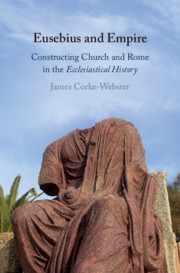Summary
The first chapter argues that it is impossible to understand the History without understanding Eusebius’ own context. It sets out in turn what we know of Eusebius’ own life and the times through which he lived, of the city of Caesarea in which he spent most of his life (and its Christian school in particular), of his literary oeuvre, and of his relationship with earlier authors (biblical, Jewish, Christian, Greek, and Roman). It seeks to demonstrate that what limited information about Eusebius’ life we have testifies largely to his scholarly tendencies; that the broader circumstances of his life, hometown, and school all encourage the impression that Eusebius was deeply rooted in a rich Graeco-Roman heritage, and shaped in particular by a Alexandrian-Caesarean Christian intellectual tradition that included Clement (and, more problematically, Origen); that this influence is evident in his extraordinarily learned, inventive, and interwoven body of work, through which runs a central historical thread and an overarching concern for pedagogy; and finally that Eusebius’ relationship with his heritage was always active – he did not simply regurgitate his inheritance, including that from Origen, but rather appropriated and moulded it to serve his own circumstances.

